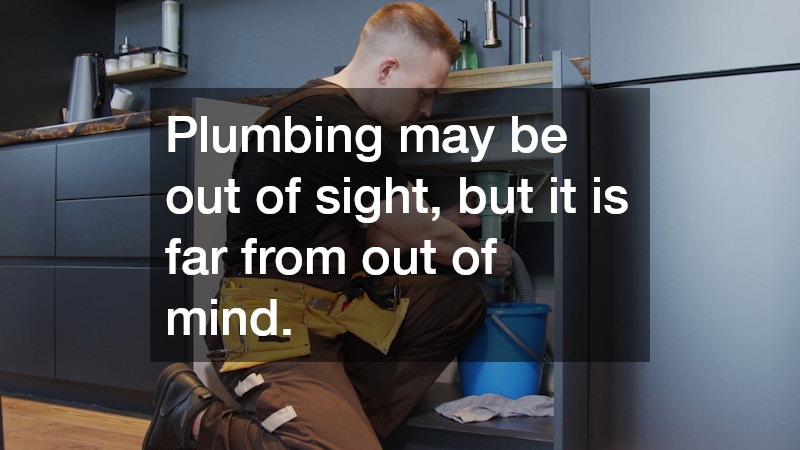The art and science of plumbing play an essential role in maintaining a home’s comfort and functionality. Despite being hidden from view, these systems are vital to ensuring our daily routines run smoothly. This article will delve into the core questions surrounding plumbing, shedding light on these unseen yet indispensable systems.
How Do Plumbing Systems Work?
Overview of Home Plumbing Systems
Home plumbing systems are an intricate network of interconnected pipes and fixtures, all designed to manage water supply and waste effectively. The main components include supply lines that bring fresh water into the home and drainage lines that remove wastewater safely and efficiently.
Understanding the layout of these systems is crucial for both maintaining them and troubleshooting issues when they arise.
In most homes, plumbing follows a straightforward path, with cold and hot water lines running parallel, feeding appliances and fixtures. The drainage component, which operates using gravity, ensures wastewater is moved away from the home to the sewer system or septic tank. Plumbers often use detailed schematics to ensure that all elements of the system are interconnected seamlessly.
The balance between supply and drainage lines ensures that water pressure is maintained consistently throughout the home. This balance is essential not only for comfort and efficiency but also for preventing potential plumbing issues. An imbalance can lead to leaks or clogs that disrupt the entire system, emphasizing the need for careful design and installation.
The Role of Gravity and Pressure
The movement of water within a home’s plumbing system relies heavily on natural forces like gravity and water pressure. Gravity plays a crucial role in the drainage process, ensuring that wastewater flows away from the home without the need for additional mechanical systems. This concept is foundational in plumbing design, focusing on sloped piping to facilitate natural water movement.
Water pressure is another critical element in plumbing systems, responsible for delivering water consistently to various fixtures within a home. When pressure levels are balanced, water can circulate efficiently, allowing multiple fixtures to operate simultaneously without a significant drop in performance. Plumbers often calibrate pressure levels to meet household needs and prevent undue stress on pipes and fixtures, which can result in leaks or bursts.
Maintaining appropriate pressure not only supports the daily functioning of plumbing systems but also impacts the longevity and efficiency of appliances. High or low pressure can significantly affect water heaters, dishwashers, and washing machines, underlining the importance of professional installation and regular maintenance. Therefore, educated plumbing design, which takes into account the nuances of gravity and pressure, is vital for efficient operation.
What Do Plumbers Do?
Installation and Maintenance of Plumbing Systems
Plumbers are essential in ensuring the smooth operation of a home’s plumbing system, beginning with accurate and professional installation. They evaluate the unique aspects of each home to determine the most efficient layout for effective water distribution and waste removal. Skilled plumbers also handle the integration of piping with appliances and fixtures, ensuring compatibility and functionality.
Maintenance is another crucial aspect of a plumber’s job, involving regular inspections and repairs to uphold system integrity. Plumbers are trained to identify potential issues before they escalate into major problems, using both traditional and modern diagnostic techniques. Routine maintenance not only preserves system efficiency but also extends the lifespan of plumbing components, making professional plumbing services a valuable investment.
Why Is Regular Plumbing Maintenance Important?
Preventive Measures
Preventive maintenance plays a vital role in avoiding significant plumbing problems within a home. By conducting routine checks and cleaning drains, homeowners can prevent blockages and other issues that might arise unexpectedly. Regular maintenance also involves checking for signs of wear and tear in pipes and fixtures, addressing potential problems before they develop into costly repairs.
During maintenance visits, plumbers may inspect water pressure levels and look for any indications of leaks or corrosion. The goal of these inspections is to keep the plumbing system operating smoothly, avoiding disruptions or emergencies that can inconvenience household members. A preventive approach ensures not only the health of the plumbing system but also supports household safety and sanitation.
Increased Efficiency and Longevity
Regular plumbing maintenance significantly contributes to both the efficiency and longevity of a home’s plumbing system. By addressing minor issues before they escalate, maintenance helps prevent inefficiencies that can arise from blockages or leaks. This proactive approach is instrumental in ensuring the system functions at peak performance, meeting daily water demands without fail.
Efficiency extends to the water heating systems and appliances connected to the plumbing. When these elements are maintained well, they operate more efficiently, saving energy and reducing utility bills. Regular maintenance can extend the life of water heaters and other appliances, delaying the need for premature replacements and the associated costs.
Cost Savings
Investing in regular plumbing maintenance can lead to substantial cost savings for homeowners. By identifying and addressing small issues early on, maintenance can prevent the exacerbation of problems that would require costly repairs. Routine upkeep helps avoid emergencies like burst pipes, which can lead to significant property damage and expense.
In addition to minimizing repair costs, regular maintenance improves the efficiency of plumbing systems, leading to reduced water and energy bills. Properly operating systems ensure optimal use of resources, reducing waste and promoting sustainability. Homeowners can also take advantage of modern smart water management systems to monitor usage and identify areas of potential savings.
Finally, by maintaining the plumbing system in optimal condition, homeowners protect property values, making homes more appealing to potential buyers. A well-documented maintenance history can reassure buyers, contributing to a smoother transaction process. Overall, proactive maintenance creates a ripple effect of benefits that encompass financial, environmental, and lifestyle aspects, making it a worthwhile investment.
Plumbing may be out of sight, but it is far from out of mind. By understanding the intricacies of plumbing systems and the vital role plumbers play, homeowners can appreciate and maintain these systems effectively, ensuring comfort and functionality within their living spaces.




